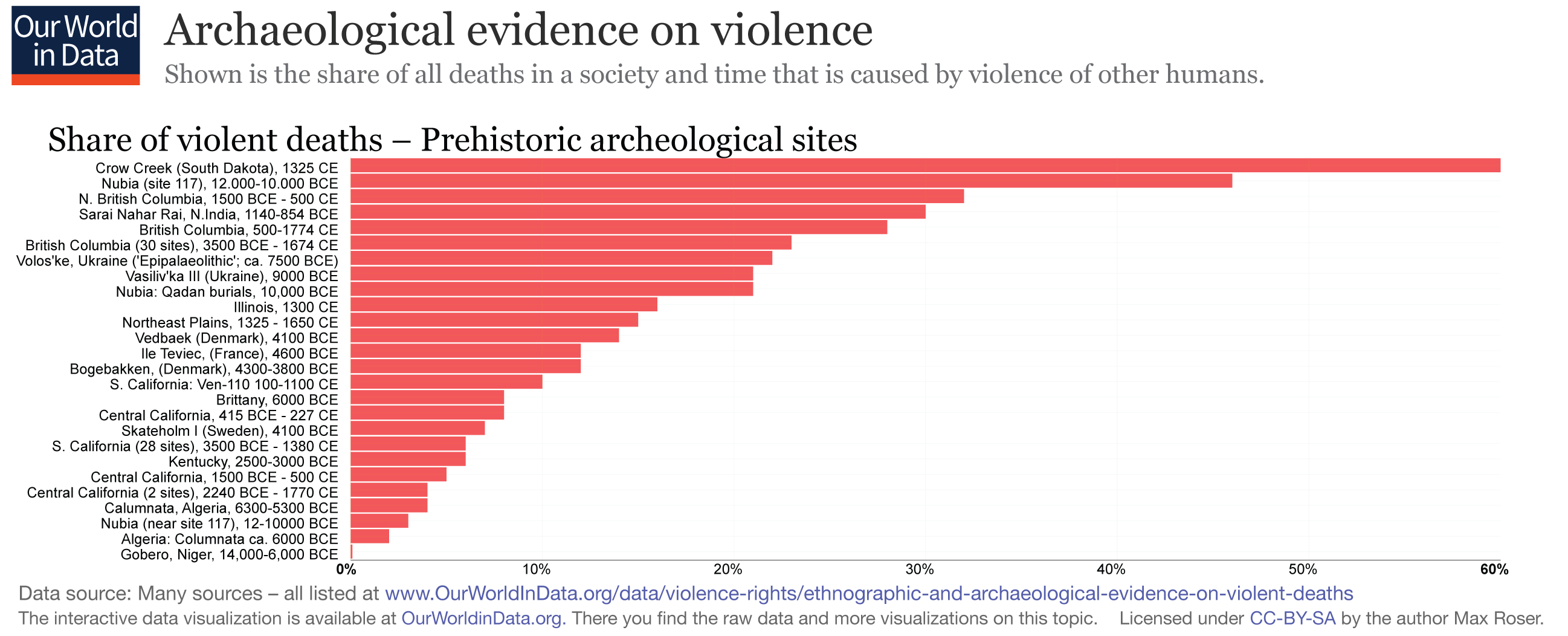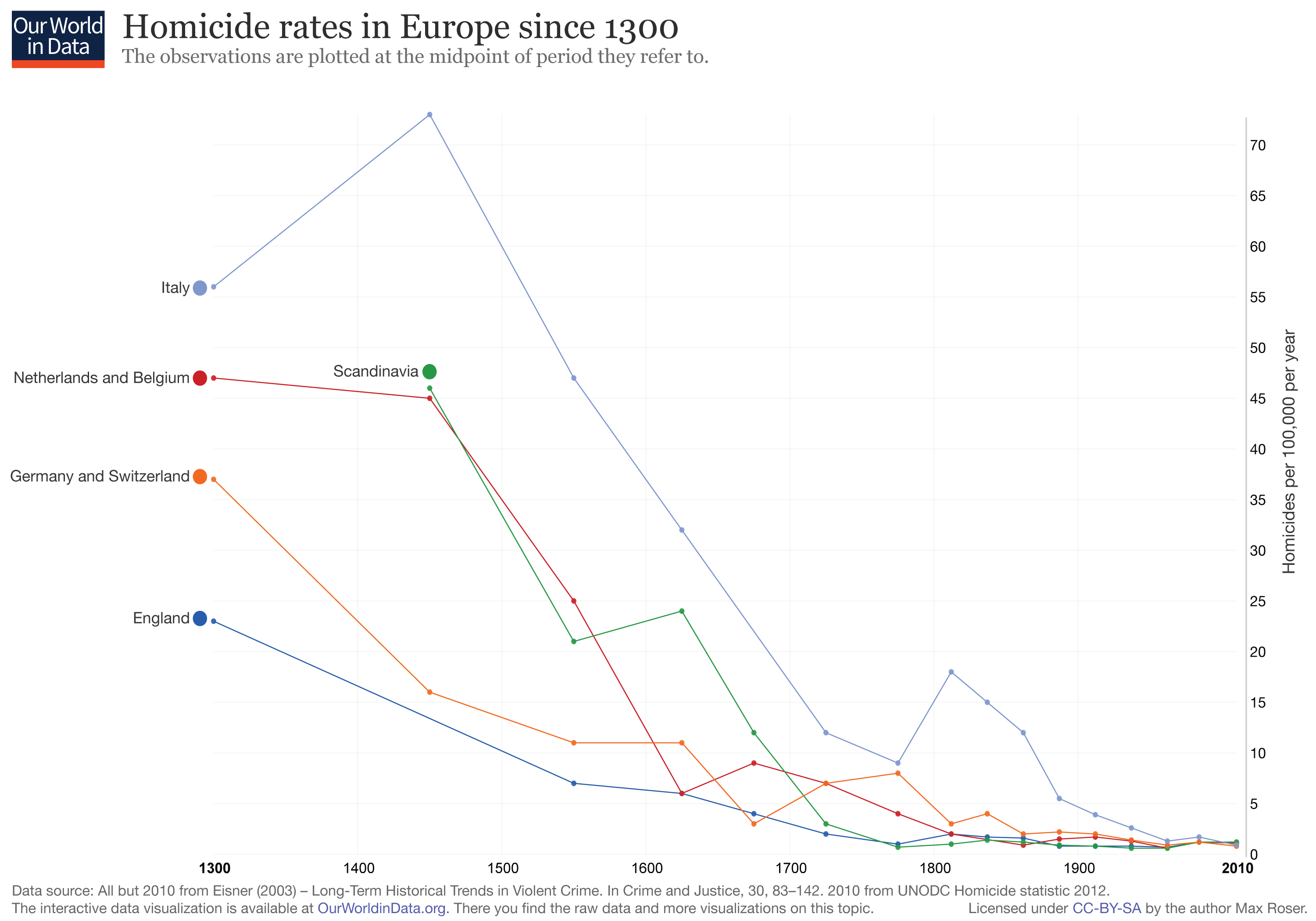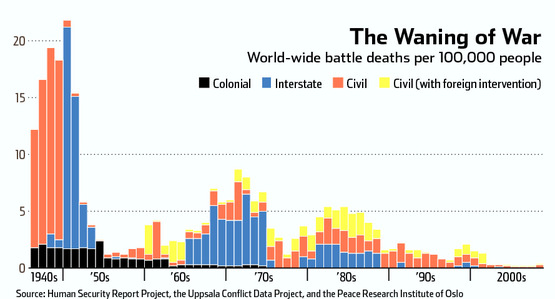The Gradual Decline of Violence
https://www.humantruth.info/decreasing_violence.html
By Vexen Crabtree 2022
#crime #democratic #don't_panic #human_rights #peace #violence
We are slowly getting more peaceful as a species. Although over the past 15 years there have been decreases in 75 countries, 86 became more peaceful1. In the long term, the overall trend is that humanity is getting less violent2,3. Most people are feeling this effect, with 75% of people globally feeling safer in 2021 than five years before1. Deaths from conflict between humans have been decreasing over the millennia; legal systems and centrally organized states have been effectively reducing interpersonal conflict. In modern times, the best places at doing this are highly democratic, comitted to human rights, and interlinked with their neighbours economically and culturally.
“[Today] you will read about a shocking act of violence. Somewhere in the world there will be a terrorist bombing, a senseless murder, a bloody insurrection. It's impossible to learn about these catastrophes without thinking, "What is the world coming to?". Believe it or not, the world of the past was much worse. Violence has been in decline for thousands of years, and today we may be living in the most peaceable era in the existence of our species.”
Steven Pinker (2011), Wall Street Journal2
- Don't Panic: The World is Not About to End and Western Culture is Safe
- The Rise of Statehood
- Continued Decline
- Mass Media: Sensationalism, Panics and Exaggeration
- Threats
- Links
1. Don't Panic: The World is Not About to End and Western Culture is Safe
#don't_panic #end_of_the_world #hope #humanity #neophobia #the_future #western_culture
Popular culture is worse than it ever has been. The education system is following it into disordered inadequacy. Unemployment is undermining society and perhaps as a result, crime rates are getting scary. Immigration is out of control. It is going to be like the fall of the Roman Empire, with weak government no longer in touch with the lives of the citizenry. The European Union is on the verge of collapse4, and, the Internet era is eroding our ability to form friendships. Youths are not being brought up properly - computer games and the TV are increasingly violent and graphic: films are now nearly all shallow and simple. Social commentator Daniel Goleman warns we now face a "collective emotional crisis" resulting in worsening social dysfunction5. Global warming and the global economy have created insurmountable problems. All of us, in our lives, are going to face chaos and witness the mass failure of morality and decency. The young no longer respect the old. Jobs and marriages are no longer for life. Did I mention the crime rates?
This, with a few variant details, is what they will think in the 2020s, because they also thought it in the 2010s and 2000s. The 1980s was a decade obsessed with the rising power of computers - they'd turn against us soon, for sure. And recessions were seemingly endless - the anarchists were winning. But perhaps they were right in the 1960s where they warned that mass immorality and liberality would destroy civilisation - if we survived nuclear war, that is. Still further back, those same feelings were echoed in the Industrial revolution, at the end of the era of Empires and at the foundation of global shipping which heralded unheard-of immigration and globalisation (hundreds of years ago). As mankind moved into cities, or into towns, the outcry against the changes in morality and customs was as loud as it was paranoid. In the 1st century CE, the Roman philosopher Seneca reassured us that the vices of mankind, including "contempt for morality... are the defects of humankind, not of the times. No era has ever been free from blame" and that "everyone reproves his own age"6. 2,000 years later, and we're still at it! However do we survive?
Luckily for us, it seems that the more people predict chaos, uncertainty, cataclysms and the end of the world as we know it, the less likely it is to actually happen. Crime rates are falling, large scale wars have apparently ceased to occur, worldwide extreme poverty has radically decreased7,8,9, literacy has been rising for hundreds of years, and technology and medical science are making astounding strides in preventing diseases (many of which are now gone for good). Jobs and marriages may not be for life, but we are living twice as long. Absolutely nothing is as bad as people say. The press thrive on bad news. Our egos trick us into thinking we are living in the most important times during our own lives. We're not. Those times are yet to come. The end is yet to come. Just remember to take a leaf from the British: Keep Calm, and Drink Tea.
For more, see:
2. The Rise of Statehood
#crime #don't_panic #peace #violence
Pinker divides the slow improvement of humanitarian affairs into stages. The first main decline in violence occurred as nations emerged with central governance, taking over from tribal rulerships.
“Forensic archeology - a kind of "CSI: Paleolithic" - can estimate rates of violence from the proportion of skeletons in ancient sites with bashed-in skulls, decapitations or arrowheads embedded in bones. And ethnographers can tally the causes of death in tribal peoples that have recently lived outside of state control. [...] These investigations show that, on average, about 15% of people in prestate eras died violently, compared to about 3% of the citizens of the earliest states.”
Steven Pinker (2011)2
Here's a visual display of the larger archeological studies that have been conducted, showing the very high rates of human conflict as cause of death in history and ancient history:

Source:Roser, Max (2016)10
Many of the things states do help reduce violence between people. The centralisation of violence and detention (i.e., military and judicial systems) means that individual weaponry becomes redundant, inter-tribe conflicts can be mediated rather than having to descend to the last resort (war), and things like education and quality of life are systematically improved. This includes patching up remaining causes of violence between classes of people: inequality. Things like improved women's education are one of the biggest indicators of a medium- and long-term drop in violence and crime11.
Other factors of modernisation - the prevalence of hobbies, the loss of religion, the organisation of disputes into formal structures rather than free-for-alls, and modern apathy, are all feeding into a culture not just of non-violence, but to an increasing extent a culture of non-physical living.
3. Continued Decline
#crime #don't_panic #peace #violence
“The second decline of violence was a civilizing process that is best documented in Europe. Historical records show that between the late Middle Ages and the 20th century, European countries saw a 10- to 50-fold decline in their rates of homicide.”
Steven Pinker (2011)2
Europe was the first continent to move towards the modern era of state-based democratic security as part of a long-term trend of peaceability regulated by state interventions.

Source: Roser, Max (2016)10
Another improvement occurred since the enlightenment-era concentration on individual human rights, alongside the increase in good and balanced governance that is based on rules of law, not on individual power. "A growing wave of countries abolished blood sports, dueling, witchhunts, religious persecution, absolute despotism and slavery"2.
Since World War II there has been an unprecedented period of peace. Before it, for example, there were non-global wars between European countries every year. "Though it's tempting to attribute the Long Peace to nuclear deterrence, non-nuclear developed states have stopped fighting each other as well. Political scientists point instead to the growth of democracy, trade and international organizations - all of which, the statistical evidence shows, reduce the likelihood of conflict. They also credit the rising valuation of human life over national grandeur - a hard-won lesson of two world wars"2.

The news will continue to show us all the bad stuff because urgency is lost when it comes to good news. This can make it hard to appreciate the statistical facts that violence and violent deaths have been declining.
4. Mass Media: Sensationalism, Panics and Exaggeration
#daily_mail #mass_media #newspapers #paranoia #the_sun #uk_newspapers #western_culture
Downmarket media publications reflect - and exaggerate - many of the fears of society. News outlets have dropped most fact-checking and critical analysis steps in order to churn out news more cheaply and quicker and as a result daft and untrue stories are appearing in mainstream news12,13. There are virtually no checks or quality control mechanisms that newspapers have to adhere to, and, occasional outrages against press misbehaviour are quickly forgotten by paying customers. The purpose of it all is (1) sell more newspapers, or (2) influence public opinion. People are all too willing to believe exaggerated claims. People want their lives to be part of historical drama14. The millennium bug, worldwide pandemics, moral panics and fear that society is going wrong all betray humankind's neophobic reactions to progress and change. Newspaper editors pick on this fear and concoct alarmist stories from everyday events and statistics; for example they publish alarmist articles on dangers from mobile phone masts even though there are none, and there are almost no good-news stories about children despite massively improved circumstances15. Many editors and media owners have explained the usefulness of fear-mongering and sensationalism - it certainly sells more copy than balanced news. Fears become amplified and made more real by their appearance in headlines, creating a hysteria about a topic whereas in reality things are much more mundane and acceptable16. Professional broadcaster Fraser McAlpine says "news outlets are behaving like spoof sites, and they're making spoof sites look like sensible news" and people are finding it harder to tell the difference17. Modern newspapers and news outlets are producing low quality, misleading and untrue stories because they are driven by consumers who prefer entertainment, gloom and outrage rather than serious text of reasonable reading. Some news outlets remain high quality, with good fact-checking and little clickbait; but the modern era in which quantity-of-page-views is more important than reputation means that quality appears to be permanently lost from popular outlets. Always remember that after thousands of hyped-up press warnings, on midnight of the 31st of December 1999, nothing happened.18
For more, see:
5. Threats
#climate_change #globalisation
The slow reduction in the threat of violence, and its actualisation, is not necessarily going to continue. Many long-term trends will continue to pull the stats down towards peace; but others are set to make things worse. At the moment, it seems that things that could buck the trend are anti-globalisation nationalist movements, climate change with its disruption of civil life and generation of refugees, and continued population growth with the result of increased competition for good land, increase competition for resources and the struggles between haves and have-nots (the latter group being the ones experiencing the highest population growth).